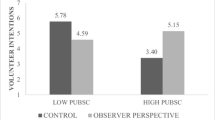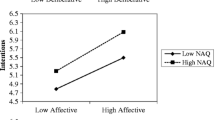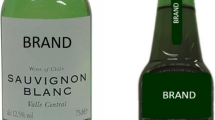Abstract
An experiment tested whether a positive experience (the endorsement and recall of one's past acts of kindness) would reduce biased processing of self-relevant health-risk information. Women college students (N = 66) who reported high or low levels of daily caffeine use were exposed to both risk-confirming and risk-disconfirming information about the link between caffeine consumption and fibrocystic breast disease (FBD). Participants were randomly assigned to complete an affirmation of their kindness via questionnaire or to a no-affirmation condition. Results indicated that the affirmation manipulation made frequent caffeine drinkers more open, less biased processors of risk-related information. Relative to frequent caffeine drinkers who did not affirm their kindness, frequent caffeine drinkers in the affirmation condition oriented more quickly to the risk-confirming information, rated the risk-confirming information as more convincing than the risk-disconfirming information, and recalled less risk-disconfirming information at a 1-week follow-up. They also reported greater perceived personal control over reducing their level of caffeine consumption. Although frequent caffeine drinkers in the affirmation condition initially reported lower intentions to reduce their caffeine consumption, there was no evidence that they were less likely to decrease their caffeine consumption at the follow-up. The possibility that positive beliefs and experiences function as self-regulatory resources among people confronting threats to health and well-being is discussed.
Similar content being viewed by others
REFERENCES
Armor, D. A., & Taylor, S. E. (1998). Situated optimism: Specific outcome expectancies and self-regulation. In M. P. Zanna (Ed.), Advances in experimental social psychology (Vol. 30, pp. 309–379). San Diego, CA: Academic Press.
Aronson, E. (1968). Dissonance theory: Progress and problems. In R. P. Abelson, E. Aronson, W. J. McGuire, T. M. Newcomb, M. J. Rosenberg, & P. H. Tannenbaum (Eds.), Theories of cognitive consistency: A sourcebook (pp. 5–27). Chicago: Rand McNally.
Aronson, E. (1969). The theory of cognitive dissonance: A current perspective. In L. Berkowitz (Ed.), Advances in experimental social psychology (Vol. 4, pp. 1–34). New York: Academic Press.
Aspinwall, L. G. (1997). Future-oriented aspects of social comparisons: A framework for studying health-related comparison activity. In B. P. Buunk & F. X. Gibbons (Eds.), Health, coping, and well-being: Perspectives from social comparison theory (pp. 125–165). Mahwah, NJ: Erlbaum.
Aspinwall, L. G. (1998). Rethinking the role of positive affect in self-regulation. Motivation and Emotion, 22, 1–32.
Aspinwall, L. G., & Brunhart, S. M. (1996). Distinguishing optimism from denial: Optimistic beliefs predict attention to health threats. Personality and Social Psychology Bulletin, 22, 993–1003.
Aspinwall, L. G., & Brunhart, S. M. (in press). What I do know won't hurt me: Optimism, attention to negative information, coping, and health. In J. Gillham (Ed.), Volume in honor of Martin Seligman's contributions to the science of optimism, hope, and resiliency. Philadelphia: Templeton Foundation.
Aspinwall, L. G., & Taylor, S. E. (1997). A stitch in time: Self-regulation and proactive coping. Psychological Bulletin, 121, 417–436.
Azjen, I. (1985). From intentions to actions: A theory of planned behavior. In J. Kuhl & J. Beckman (Eds.), Action-control: From cognition to behavior (pp. 11–39). Heidelberg, Germany: Springer.
Azjen, I. (1991). The theory of planned behavior. Organizational Behavior and Human Decision Processes, 50, 179–211.
Azjen, I., & Madden, T. J. (1986). Prediction of goal-directed behavior: Attitudes, intentions, and perceived behavioral control. Journal of Experimental Social Psychology, 22, 453–474.
Banaji, M. R., & Prentice, D. A. (1994). The self in social contexts. Annual Review of Psychology, 45, 297–332.
Bandura, A. (1986). Social foundations of thought and action: A social cognitive theory. Englewood Cliffs, NJ: Prentice-Hall.
Bandura, A. (1989). Perceived self-efficacy in the exercise of control over AIDS infection. In V. M. Mays, G. W. Albee, & S. F. Schneider (Eds.), The primary prevention of AIDS: Psychological approaches (pp. 128–141). Newberry Park, CA: Sage.
Baumeister, R. F. (1989). The optimal margin of illusion. Journal of Social and Clinical Psychology, 8, 176–189.
Boyle, C. A., Berkowitz, G. S., LiVolsi, V. A., Ort, S., Merino, M. J., White, C., & Kelsey, J. L. (1984). Caffeine consumption and fibrocystic breast disease: A case-control epidemiologic study. Journal of the National Cancer Institute, 72, 1015–1019.
Breznitz, S. (1983). The seven kinds of denial. In S. Breznitz (Ed.), The denial of stress (pp. 257–286). New York: International Universities Press.
Brown, J. D. (1990). Evaluating one's abilities: Shortcuts and stumbling blocks on the road to self-knowledge. Journal of Experimental Social Psychology, 26, 149–167.
Brown, J. D., & Dutton, K. A. (1995). Truth and consequences: The costs and benefits of accurate self-knowledge. Personality and Social Psychology Bulletin, 21, 1288–1296.
Colvin, C. R., & Block, J. (1994). Do positive illusions foster mental health? An examination of the Taylor and Brown formulation. Psychological Bulletin, 116, 3–20.
Cooper, J., & Fazio, R. H. (1984). A new look at dissonance theory. In L. Berkowitz (Ed.), Advances in experimental social psychology (Vol. 17, pp. 229–266). Orlando, FL: Academic Press.
Croyle, R. T. (1992). Appraisal of health threats: Cognition, motivation, and social comparison. Cognitive Therapy and Research, 16, 165–182.
Ditto, P. H., & Boardman, A. F. (1995). Perceived accuracy of favorable and unfavorable psychological feedback. Basic and Applied Social Psychology, 16, 137–157.
Ditto, P. H., & Croyle, R. T. (1995). Understanding the impact of risk factor test results: Insights from a basic research program. In R. T. Croyle (Ed.), Psychosocial effects of screening for disease prevention and detection (pp. 144–181). New York: Oxford University Press.
Ditto, P. H., Jemmott, J. B., III., & Darley, J. M. (1988). Appraising the threat of illness: A mental representational approach. Health Psychology, 7, 183–201.
Ditto, P. H., & Lopez, D. F. (1992). Motivated skepticism: Use of differential decision criteria for preferred and nonpreferred conclusions. Journal of Personality and Social Psychology, 63, 568–584.
Ditto, P. H., Scepansky, J. A., Munro, G. D., Apanovitch, A. M., & Lockhart, L. K. (1998). Motivated sensitivity to preference-inconsistent information. Journal of Personality and Social Psychology, 75, 53–69.
Eagly, A. H., & Chaiken, S. (1993). The psychology of attitudes. Orlando, FL: Harcourt, Brace Jovanovich.
Estrada, C. A., Isen, A. M., & Young, M. J. (1997). Positive affect facilitates integration of information and decreases anchoring in reasoning among physicians. Organizational Behavior and Human Decision Processes, 72, 117–135.
Festinger, L. (1957). A theory of cognitive dissonance. Evanston, IL: Row Peterson.
Fishbein, M., & Ajzen, I. (1975). Belief, attitude, intention, and behavior: An introduction to theory and research. Reading, MA: Addison-Wesley.
Fredrickson, B. L. (in press). What good are positive emotions? Review of General Psychology, 2.
Frey, D. (1986). Recent research on selective exposure to information. In L. Berkowitz (Ed.), Advances in experimental social psychology (Vol. 19, pp. 41–80). Orlando, FL: Academic Press.
Gibbons, F. X., & Gerrard, M. (1997). Health images and their effects on health behavior. In B. P. Buunk & F. X. Gibbons (Eds.), Health, coping, and well-being: Perspectives from social comparison theory (pp. 63–94). Mahwah, NJ: Erlbaum.
Giner-Sorolla, R., & Chaiken, S. (1997). Selective use of heuristic and systematic processing under defense motivation. Personality and Social Psychology Bulletin, 23, 84–97.
Greenwald, A. G. (1980). The totalitarian ego: Fabrication and revision of personal history. American Psychologist, 35, 603–618.
Hobfoll, S. E. (1989). Conservation of resources: A new attempt at conceptualizing stress. American Psychologist, 44, 513–524.
Isen, A. M. (1970). Success, failure, attention, and reaction to others: The warm glow of success. Journal of Personality and Social Psychology, 15, 294–301.
Isen, A. M. (1993). Positive affect and decision making. In M. Lewis & J. M. Haviland (Eds.), Handbook of emotions (pp. 261–277). New York: Guilford Press.
Isen, A. M. (in press). Positive affect. In T. Dagleish & M. Powers (Eds.), Handbook of cognition and emotion. London: Wiley.
Jepson, C., & Chaiken, S. (1990). Chronic issue-specific fear inhibits systematic processing of persuasive communications. Journal of Social Behavior and Personality, 5, 61–84.
Jemmott, J. B., III., Ditto, P. H., & Croyle, R. T. (1986). Judging health status: Perceived prevalence and personal relevance. Journal of Personality and Social Psychology, 50, 899–905.
Jussim, L., Yen, H., & Aiello, J. R. (1995). Self-consistency, self-enhancement, and accuracy in reactions to feedback. Journal of Experimental Social Psychology, 31, 322–356.
Keppel, G. (1991). Design and analysis: A researcher's handbook (3rd ed.). Englewood Cliffs, NJ: Prentice-Hall.
Kincaid, J. P., Fishburne, R., Rogers, R. L., & Chissom, B. S. (1975). Derivation of new readability formulas (Automated Readability Index, Fog Count, and Flesch Reading Ease formula) for Navy enlisted personnel (Branch Report 8-75). Millington, TN: Chief of Naval Training.
Klein, W. M., & Weinstein, N. D. (1997). Social comparison and unrealistic optimism about personal risk. In B. P. Buunk & F. X. Gibbons (Eds.), Health coping, and well-being: Perspectives from social comparison theory (pp. 25–61). Mahwah, NJ: Erlbaum.
Kunda, Z. (1987). Motivated inference: Self-serving generation and evaluation of causal theories. Journal of Personality and Social Psychology, 53, 636–647.
Kunda, Z. (1990). The case for motivated reasoning. Psychological Bulletin, 108, 480–498.
La Vecchia, C., Franceschi, S., Parazzini, F., Regallo, M., Decarli, A., Gallus, G., Di Pietro, S., & Tognoni, G. (1985). Benign breast disease and consumption of beverages containing methylxanthines. Journal of the National Cancer Institute, 74, 995–1000.
Lazarus, R. S. (1983). The costs and benefits of denial. In S. Breznitz (Ed.), The denial of stress (pp. 1–30). New York: International Universities Press.
Leventhal, H. (1970). Findings and theory in the study of fear communications. In L. Berkowitz (Ed.), Advances in experimental social psychology (Vol. 5, pp. 119–186). New York: Academic Press.
Liberman, A., & Chaiken, S. (1992). Defensive processing of personally relevant health messages. Personality and Social Psychology Bulletin, 18, 669–679.
Liu, T. J., & Steele, C. M. (1986). Attribution as self-affirmation. Journal of Personality and Social Psychology, 51, 531–540.
O'Leary, A. (1985). Self-efficacy and health. Behaviour Research and Therapy, 23, 437–451.
Pyszczynski, T. A., & Greenberg, J. (1987). Toward an integration of cognitive and motivational perspectives on social inference: A biased hypothesis-testing model. In L. Berkowitz (Ed.), Advances in experimental social psychology, (Vol. 20, pp. 297–340). San Diego, CA: Academic Press.
Ruble, D. N., & Frey, K. S. (1991). Changing patterns of comparative behavior as skills are acquired: A functional model of self-evaluation. In J. Suls & T. A. Wills (Eds.), Social comparison: Contemporary theory and research (pp. 79–113). Hillsdale, NJ: Erlbaum.
Sachs, P. R. (1982). Avoidance of diagnostic information in self-evaluation of ability. Personality and Social Psychology Bulletin, 8, 242–246.
Schwarzer, R. (1994). Optimism, vulnerability, and self-beliefs as health-related cognitions: A systematic overview. Psychology and Health, 9, 161–180.
Sedikides, C., & Strube, M. J. (1995). The multiply motivated self. Personality and Social Psychology Bulletin, 21, 1330–1335.
Sedikides, C., & Strube, M. J. (1997). Self-evaluation: To thine own self be good, to thine own self be sure, to thine own self by true, and to thine own self be better. In M. P. Zanna (Ed.), Advances in experimental social psychology (Vol. 29, pp. 209–269). San Diego, CA: Academic Press.
Silicon Beach Software, Inc. (1989). Supercard v1.6. San Diego, CA: Author.
Steele, C. M. (1975). Name calling and compliance. Journal of Personality and Social Psychology, 31, 361–369.
Steele, C. M. (1988). The psychology of self-affirmation: Sustaining the integrity of the self. In L. Berkowitz (Ed.), Advances in experimental social psychology (Vol. 21, pp. 261–302). San Diego, CA: Academic Press.
Steele, C. M., & Liu, T. J. (1981). Making the dissonance act unreflective of the self: Dissonance avoidance and the expectancy of a value-affirming response. Personality and Social Psychology Bulletin, 7, 387–393.
Steele, C. M., & Liu, T. J. (1983). Dissonance processes as self-affirmation. Journal of Personality and Social Psychology, 41, 5–19.
Steele, C. M., Spencer, S. J., & Lynch, M. (1993). Self-image resilience and dissonance: The role of affirmational resources. Journal of Personality and Social Psychology, 64, 885–896.
Swann, W. B., & Schroeder, D. G. (1995). The search for beauty and truth: A framework for understanding reactions to evaluations. Personality and Social Psychology Bulletin, 21, 1307–1318.
Taylor, S. E., & Aspinwall, L. G. (1990). Psychosocial aspects of chronic illness. In P. T. Costa, Jr., & G. R. VandenBos (Eds.), Psychological aspects of serious illness: Chronic conditions, fatal disease, and clinical care (pp. 3–60). Washington, DC: American Psychological Association. (First presented as a Master Lecture at the American Psychological Association annual meetings, New Orleans, LA, (August, 1989).
Taylor, S. E., & Aspinwall, L. G. (1996). Mediating and moderating processes in psychosocial stress: Appraisal, coping, resistance and vulnerability. In H. B. Kaplan (Ed.), Psychosocial stress: Perspectives on structure, theory, life-course, and methods (pp. 71–110). San Diego: Academic Press.
Taylor, S. E., & Brown, J. D. (1988). Illusion and well-being: A social psychological perspective on mental health. Psychological Bulletin, 103, 193–210.
Taylor, S. E., & Brown, J. D. (1994). Positive illusions and well-being revisited: Separating fact from fiction. Psychological Bulletin, 116, 21–27.
Taylor, S. E., Collins, R. L., Skokan, L. A., & Aspinwall, L. G. (1989). Maintaining positive illusions in the face of negative facts: Getting the facts without letting them get to you. Journal of Social and Clinical Psychology, 8, 114–129.
Taylor, S. E., Neter, E., & Wayment, H. A. (1995). Self-evaluation processes. Personality and Social Psychology Bulletin, 21, 1278–1287.
Tesser, A. (1988). Toward a self-evaluation maintenance model of social behavior. In L. Berkowitz (Ed.), Advances in experimental social psychology (Vol. 21, pp. 181–227). San Diego, CA: Academic Press.
Tesser, A., Chen, N., Collins, J. C., Cornell, D., & Beach, S. R. H. (1997). Confluence of self-defense mechanisms: On integrating the self-zoo. Unpublished manuscript, University of Georgia.
Tesser, A., & Cornell, D. P. (1991). On the confluence of self-processes. Journal of Experimental Social Psychology, 27, 501–526.
Tesser, A., Martin, L. L., & Cornell, D. P. (1996). On the substitutability of self-protective mechanisms. In P. M. Gollwitzer & J. A. Bargh (Eds.), The psychology of action: Linking cognition and motivation to behavior (pp. 48–68). New York: Guilford Press.
Thibodeau, R., & Aronson, E. (1992). Taking a closer look: Reasserting the role of the self-concept in dissonance theory. Personality and Social Psychology Bulletin, 18, 591–602.
Trope, Y. (1980). Self-assessment, self-enhancement, and taste preference. Journal of Experimental Social Psychology, 16, 116–129.
Trope, Y. (1986). Self-assessment, self-enhancement, and achievement behavior. In R. M. Sorrentino & E. T. Higgins (Eds.), Handbook of motivation and cognition (pp. 350–378). New York: Guilford Press.
Trope, Y., & Brickman, P. (1975). Difficulty and diagnosticity as determinants of choice among tasks. Journal of Personality and Social Psychology, 31, 918–925.
Trope, Y., & Neter, E. (1994). Reconciling competing motives in self-evaluation: The role of self-control in feedback seeking. Journal of Personality and Social Psychology, 66, 646–657.
Trope, Y., & Pomerantz, E. M. (1998). Resolving conflicts among self-evaluative motives: Positive experiences as a resource for overcoming defensiveness. Motivation and Emotion, 22, 53–72.
Weinstein, N. D., & Klein, W. M. (1995). Resistance of personal risk perceptions to debiasing interventions. Health Psychology, 14, 132–140.
Wood, J. V. (1989). Theory and research concerning social comparisons of personal attributes. Psychological Bulletin, 106, 231–248.
Wyer, R. S., & Frey, D. (1983). The effects of feedback about self and others on the recall and judgments of feedback-relevant information. Journal of Personality and Social Psychology, 19, 540–559.
Zukerman, M., Brown, R. H., Fischler, G. L., Fox, G. A., Lathin, D. R., & Minesian, A. J. (1979). Determinants of information seeking behavior. Journal of Research in Personality, 13, 161–174.
Author information
Authors and Affiliations
Rights and permissions
About this article
Cite this article
Reed, M.B., Aspinwall, L.G. Self-Affirmation Reduces Biased Processing of Health-Risk Information. Motivation and Emotion 22, 99–132 (1998). https://doi.org/10.1023/A:1021463221281
Issue Date:
DOI: https://doi.org/10.1023/A:1021463221281




